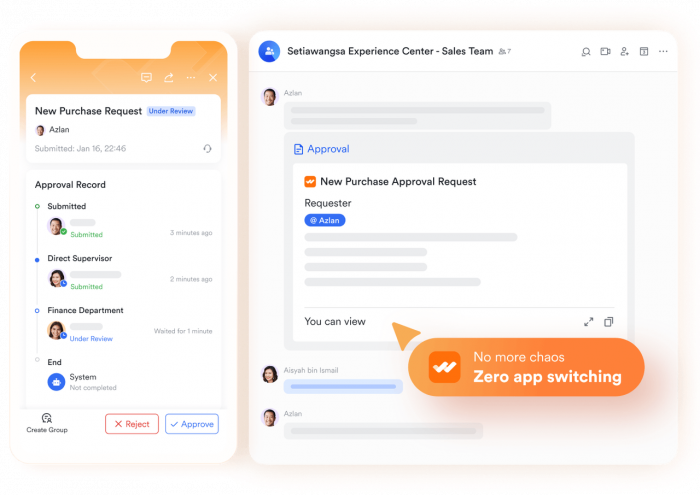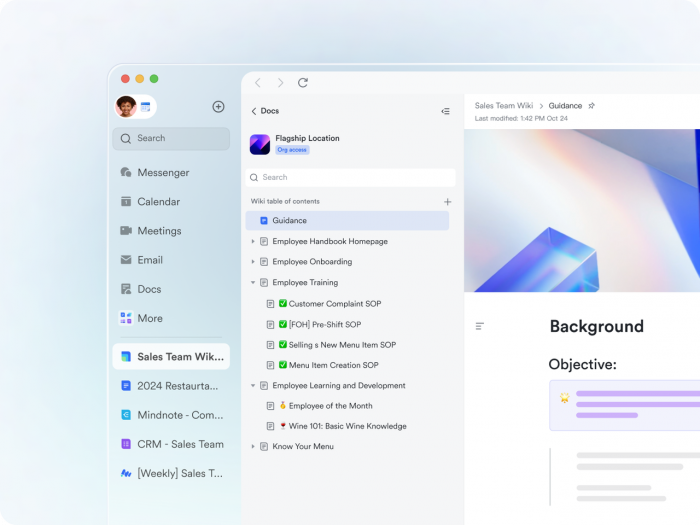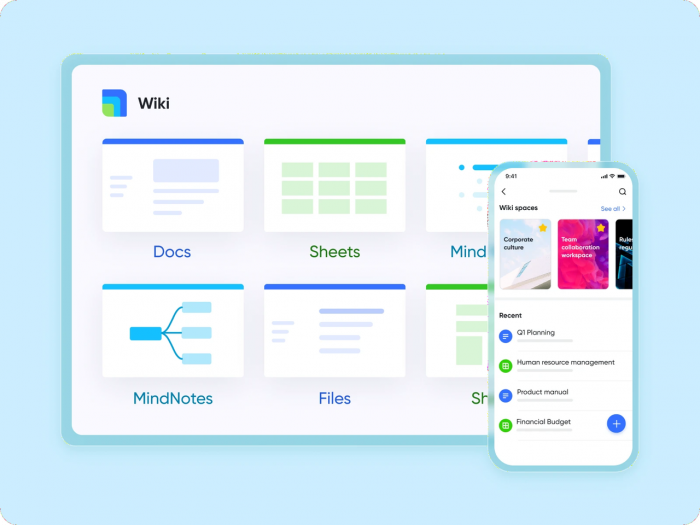Table of Content
- Lark Base: Centralizing records for quick response
- Lark Messenger: Keeping communication clear and actionable
- Lark Calendar: Synchronizing crisis-response timelines
- Lark Approval: Accelerating decisions in high-stakes moments
- Lark Docs: Creating a shared source of truth in real time
- Lark Wiki: Preserving institutional knowledge for future crises
- Conclusion
A crisis tests the processes of a business. When anything goes wrong with the supply chain, the rules change suddenly, or there is a worldwide event that stops normal business, companies need to act quickly and with confidence. But when things become bad, a lot of firms' teams' tools stop working. When you need to be clear the most, it might be more confusing when people talk to each other in different ways, records are duplicated, and judgments are made too late.
The best project management tools help you get through hard times in the best way possible. By connecting all of their operations together, they give teams a single source of truth, easy means to talk to each other, and reliable ways to make choices. One of these tools is Lark, which helps companies get from chaos to clarity when it matters most.
Lark Base: Centralizing records for quick response
It's hard to make a decision when data is all over the place during a crisis. Leaders can't make good judgments if sales, operations, and finance are all using various systems. Lark Base solves this by combining records, projects, and workflows into one adaptable hub.
Base is more than just a way to keep track of projects; it also offers features that are similar to those of a CRM app. Sales, for instance, might maintain track of pipelines and client interactions while also keeping an eye on opportunities, operations, and finances. Leaders can see everything and make clear decisions when it matters most when they keep track of both their supply chain and their costs in the same system.
Dashboards illustrate how well things are doing right now, and related records link contracts, tasks, and approvals in a way that makes sense. Teams can choose how they want to see information, from a kanban, Gantt, or grid perspective. Base takes messy data and makes it clear and organized, which helps individuals deal with emergencies more quickly and effectively.
Lark Messenger: Keeping communication clear and actionable
When things go wrong, talking to other people can either help or make them panic. Email chains and chat apps that don't connect typically hide key information, which makes it challenging for teams to decide what to do first. Lark Messenger stops this by putting all conversations into a structured, action-oriented channel.
Threaded conversations keep negotiations on track by keeping them focused on specific crisis-response efforts. Pinned updates show critical information, and mention letting the proper people know what's going on right away. When teams from all over the world need to work together, built-in translation makes it easier.
Messenger is the most useful because it goes straight to Base and Tasks. This means that communication regarding a problem can quickly become an action that can be followed. This makes sure that crisis communication doesn't just stop at letting people know; it leads to the right action.
Lark Calendar: Synchronizing crisis-response timelines
Missing deadlines or having timetables that don't match up might make a problem worse when every hour matters. Lark Calendar makes timelines more predictable and in sync, which helps teams stay on the same page.
Everyone in the company may see critical events and deadlines on shared calendars. Automatic time zone conversion makes sure that teams throughout the world are on the same page, and reminders make sure that tasks don't go lost. Events link to Base records or Docs, which makes sure that meetings and crisis check-ins always contain the right information.
Calendar helps organizations stay on track by syncing up their schedules, which keeps them moving forward even when things become rough.
Lark Approval: Accelerating decisions in high-stakes moments

Getting authorization is sometimes the hardest aspect of a crisis. You could require speedy approvals for changes to your budget, contracts, or compliance, but processes that aren't clear make things take longer. Lark Approval cuts down on these delays by making choices more orderly and reliable.
Standardized forms make it easy to ask for things and make fewer mistakes. Managers can see what approvals are still needed on the interface, and role-based permissions keep sensitive data safe. Logs make it easy to see what decisions were made, which makes it easier to follow the rules, even when things go wrong.
Approval also includes an automated workflow that distributes requests to the correct persons right away. Notifications make sure that nothing is missed, while reminders make sure that things aren't put off. Approval keeps the process efficient and accountable, which helps organizations make quick, responsible decisions in high-stakes circumstances.
Lark Docs: Creating a shared source of truth in real time

Documentation is highly vital during a crisis, whether it's establishing new safety standards, sending updates to clients, or keeping track of how the crisis affects finances. But things take longer because of version instability and email attachments. Lark Docs fixes this problem by letting more than one person work on the same document at the same time.
When teams work on documents together in real time, changes are made right away and are easy to find. Inline comments make it easy to understand feedback, and version history makes sure that changes are saved. Embedded Sheets or Base records insert active data right into the document, so you can be guaranteed that the information is always correct and in context.
Docs keeps everyone on the same page, which makes it easier to make quick decisions without being confused.
Lark Wiki: Preserving institutional knowledge for future crises

We learn something from every crisis, but we typically forget what we learned when things go back to "normal." Lark Wiki stops this loss of knowledge by putting all of the processes, playbooks, and crisis response plans in one location.
HR can keep track of new rules, operations can maintain track of how to follow them, and leadership can keep track of rules for when things go wrong in the future. Permissions protect sensitive information, and rapid updates make sure that information is always up to date with the most recent decisions. The search function makes it easy for employees to find the information they need when they aren't sure what to do.
Instead of making the organization weaker, Wiki makes sure that every crisis makes it stronger.
Conclusion
When things go wrong, businesses can't afford to be wasteful. Having tools all over the place and keeping workflows separate makes things more complicated, slows down decision-making, and lowers trust. With unified systems like Lark, this is no longer the case. They combine data, communication, and approvals into one system that is quick and easy to use.
Base puts all your records in one place and allows you the same freedom as a CRM. Messenger makes sure that messages are clear and helpful. Calendar maintains track of critical due dates. Automated process accelerates up decisions by getting approval. Docs make sure that everyone has the same information. Wiki preserves knowledge that institutions have alive so that it can be used again in the future. These attributes help businesses survive through hard times by not only staying alive, but also by being clear and sure of themselves.


